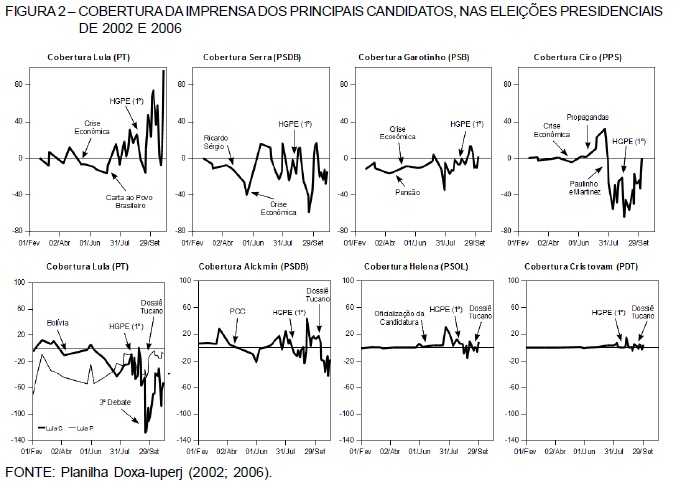This article presents the results of research on the effects of press coverage of voting in the 2002 and 2006 Brazilian presidential elections of. We argue that it was an important factor in both campaigns. Our dependent variable is made up of a historical series on intention to vote for the major candidates: Lula (Worker's Party or PT, Partido dos Trabalhadores), Serra (Brazilian Social Democratic Party, or PSDB, Partido da Social Democracia Brasileira), Garotinho (Brazilian Socialist Party or PSB, Partido Socialista Brasileiro) and Ciro Gomes (Popular Socialist Party or PPS, Partido Popular Socialista) in 2002, and Lula, Alckmin (PSDB), Heloísa Helena (Party of Socialism and Freedom, or PSOL, Partido Socialismo e Liberdade) and Cristovam Buarque (Democratic Worker's Party, or PDT, Partido Democrático Trabalhista) in 2006. Our main explanatory variable is electoral coverage in the country's four major daily newspapers: Folha de S. Paulo, O Estado de S. Paulo, O Globo and Jornal do Brasil. The following control variables complete our model: candidates' party propaganda, the free publicly-sponsored electoral broadcasting time - known as Horário Político Gratuito Eleitoral - in the first and second rounds, presidential debates and presidential popularity rates. Models were estimated through MQO. Test results indicate that in 2002, press coverage given to candidates Lula and Ciro Gomes was one of factors responsible for the variation observed in voting intentions. In 2006, dynamics were a bit more complex. The only the intentions to vote affected by coverage were those for candidate Heloisa Helena. Furthermore, it is surprising that Lula's extremely negative coverage did not cost him votes. Yet this coverage did have an important indirect impact on candidates Alckmin and Cristovam Buarque. Since this impact was larger during the scandal involving PSDB activities, we can assert that press coverage contributed decisively to the need for a second round in the last presidential election. These results are sustained even when applied to analysis of voting patterns for voters with different educational levels, used as a means of controlling for different levels of exposure to newspaper coverage.
Press Coverage; Media Effects; Brazilian Presidential Elections





